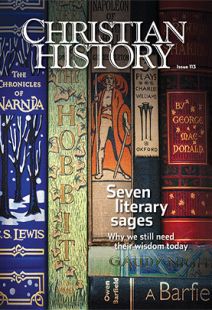Editor's note: Seven literary sages
IN LATE 2013 I was walking through the streets of Oxford and London, seeking traces of seven sages amid bustling modern shops, chattering businesspeople, and shuttered churches.
Why was I there? To see a stone memorializing C. S. Lewis formally installed into Poet’s Corner at Westminster Abbey on November 22. There great authors and artists of Britain have historically been remembered. (You can read more about the service on p. 9.) He gained a memorial stone there beside British literary greats like Chaucer, Shakespeare, Byron, Dickens, Austen, the Brontë sisters, T. S. Eliot, and W. H. Auden. My husband, kids, and I spent the days before the service joining fellow Lewis enthusiasts at a meeting of the Oxford C. S. Lewis Society, a tour of the Kilns (Lewis’s home, now a museum), and a symposium on Lewis’s works. (You can see us below at his grave.)
On the way home, we visited Dublin, Ireland, and attended Sunday morning worship at Trinity College. There I met a woman who became interested in our trip to the Lewis memorial service. She obviously knew of Lewis’s status as a British author and had seen the movie Shadowlands. But she was puzzled by my being there on behalf of a Christian magazine. “Was Lewis particularly religious?” she asked.
I wondered: though Christians have valued his work for decades, how much did Lewis and his friends and mentors change the society around them? What legacy did they leave to the modern secular world?
Art, grace, and truth
Quite a lot, it turns out. The seven Christian writers featured in the coming pages began influencing readers with George MacDonald’s Phantastes, a fairy tale published in 1858. Some years later, G. K. Chesterton’s rollicking stories and forthright newspaper columns brought a Christian perspective to the social issues of his day. After World War II, five authors who had read and taken to heart both MacDonald and Chesterton—Lewis, J. R. R. Tolkien, Owen Barfield, Dorothy L. Sayers, and Charles Williams—took on a generation of secularists and modernizers with their weapon of choice: the pen.
They expressed a vision for society in areas such as economics, education, and the environment; a vision for Christian literature in moving treatments of goodness and self-sacrifice; a vision for discipleship in pictures of love in community. (We’ll talk about one vision from each author in this issue.) Millions read their books and are inspired, by God’s grace, to create art, practice goodness, and seek truth. I am one of them: from Prince Caspian to Lord of the Rings to Gaudy Night to The Greater Trumps to Orthodoxy, the logical arguments and poetic visions of these “seven sages” have enriched my Christian discipleship for decades. Perhaps yours too.
American English professor Clyde Kilby, who visited Tolkien in Oxford in 1964, was so inspired that in 1965 he established a study center devoted to these seven authors at Wheaton College. Today called the Marion E. Wade Center, it has cooperated generously with time and talent in the production of this issue, dedicated to its 50th anniversary.
Many today willingly venture into the fantasy worlds created by these sages. But, as they enter Narnia, the Shire, and the worlds of Lord Peter Wimsey and Father Brown, do they realize that they are connecting to something larger than themselves and that they will find deep treasures of truth awaiting them? Join us as we look into these authors’ works to, as Lewis once put it, steal “past watchful dragons” of fear, doubt, and disdain to tell, once again, the old, old story that we have loved so long. CH
By Jennifer Woodruff Tait
[Christian History originally published this article in Christian History Issue #113 in 2015]
Jennifer Woodruff Tait is managing editor of Christian History.Next articles
Bread of the earth and bread of heaven
G. K. Chesterton (1874-1936) wanted a new kind of Christian economics
Ralph C. WoodSayers “begins here” with a vision for social and intellectual change
Sayers was asked to compose a wartime message
Crystal DowningWhy hobbits eat local
J. R. R. Tolkien (1892-1973) and his friend Lewis shared an ideal of remaining rooted on the land of God’s good creation
Matthew DickersonMeeting Professor Tolkien
He laughed at the idea of being a classical author while still alive
Clyde S. KilbySupport us
Christian History Institute (CHI) is a non-profit Pennsylvania corporation founded in 1982. Your donations support the continuation of this ministry
Donate



